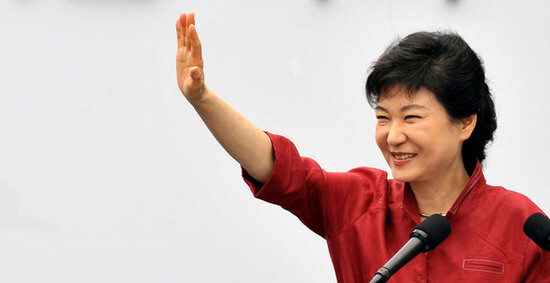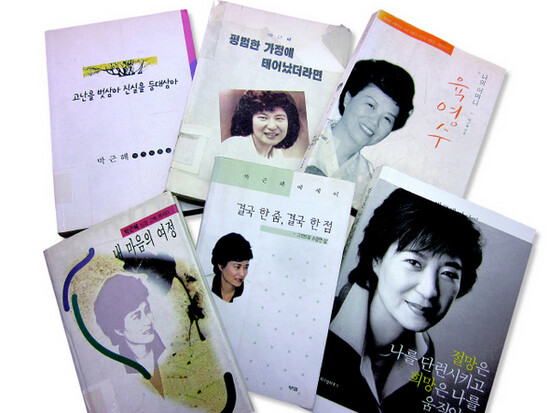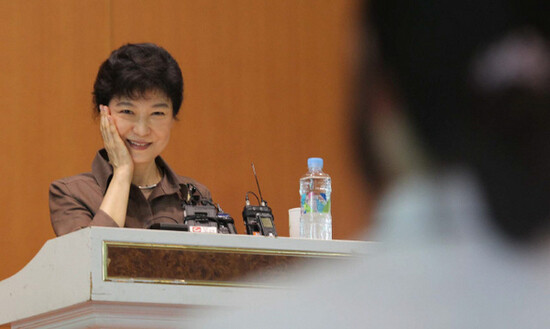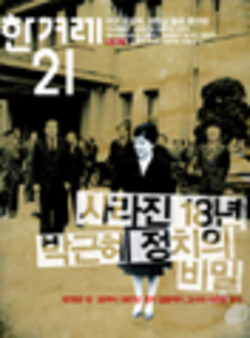hankyoreh
Links to other country sites 다른 나라 사이트 링크
[Special Feature] Park Geun-hye’s past and future

By Song Ho-kyun and Ko Na-mu, Hankyoreh 21 staff reporters
Park Geun-hye, 60, officially threw her hat in the ring for the presidency in an announcement on July 10. It has been fifteen years since she entered politics, but questions still linger about her leadership abilities. Park herself has been quiet. Leadership ability has a major impact on a president’s capacity to run a country. This is why Hankyoreh 21 cautiously ventured to break through the wall of silence and find the real person inside, and to establish a link between Park’s past and present.Reporters drew on Park’s autobiography and six essays she wrote between her father’s assassination on Oct. 26, 1979, and her own entry into politics in 1997. It was a period that saw citizen Park mixed with Park the prospective politician. Through her words and speech during that time, the Hankyoreh 21 pieced together what she said about politics. These were then compared with her words and deeds since entering the political arena in 1997. Caution was taken against any preconceptions about what Park Chung-hee’s daughter would be like.
Four main themes were identified. Hopefully, they will be keys in unlocking the screen of mystery that covers Park the politician.
Theme 1: Betrayal
The first thing that comes into view under the thick shell over Park’s feelings is her sense of betrayal. The roots of this can be found in her experience seeing politicians from her father’s Democratic Republican Party criticize the Yushin government after Park Chung-hee’s 1979 assassination. Her journal entry from Sept. 30, 1981, reads, “The punishment of a betrayer, more than anything else, is the fact that you have destroyed a vital fortress in your own heart. By committing one act of betrayal, your resistance against committing betrayal gradually weakens, and that second and third betrayals become that much easier.”
Park was born on Feb. 2, 1952. She left the Blue House in early November 1979 after a nine-day funeral observance for her father. She went back to the house in Seoul’s Sindang neighborhood where the family had lived before the 1961 coup that put her father in power. The harsh Chun Doo-hwan administration soon came to power in 1980. During the brief interim, however, there had been much debate and criticism over Park Chung-hee and the era he represented.
Some of the critics were members of the old Democratic Republican Party, most prominently former Prime Minister Kim Jong-pil. There was some reason for this. As president, Park had been very alarmed about the clever young officer who had drafted the initial revolutionary pledge and choreographed his own actions in the coup. After he opposed a third-term amendment of Constitution in 1969, then-prime minister Kim was no longer family to Park, but a political rival. Even after Kim reversed his position on the amendment, the Korean Central Intelligence Agency continued monitoring his home over the next decade. Some of the Democratic Republic figures, however, were denouncing the Yushin government in an attempt to stay alive under Chun. To the then-29-year-old Park Geun-hye, the whole controversy came as an affront.
In a piece for the Jan. 1989 edition of the Women’s Dong-A, a monthly magazine for women, she wrote, “If you look at the politicians who previously held important positions in the Yushin era, you’ll often see, and this may be because of the current landscape that views Yushin as a sin, but a number of them are insisting, ‘Oh, I was opposed to it back then. I didn’t have the power then to fight it.’ To those people, I would like to ask why they did not give up their positions, if they really thought it was a bad regime. If someone’s judgment changes and becomes clouded with by contemporary context, then such a person should never again hold public office.”
The sense of betrayal stayed with her. On May 19, 1989, she gave an interview on the MBC show “Current Affairs Discussion with Park Gyeong-jae” where she asked why Kim, former Democratic Justice Party (formerly the Democratic Republican Party) chairman Park Joon-kyu, and former National Assembly speaker Kim Jae-sun were not defending the system. “During the Yushin era, when my father was still alive, they were going around saying, ‘Yushin is the our only path to survival!’ Their refusal to defend Yushin after he died - well, we can turn that around and say that the reason they were advocating Yushin back then is not because they actually believed in it, but because it was the only way they could hold high positions…. ”
In 2007, Park was already a ten-year veteran of politics. The theme of betrayal surfaced again in her autobiography that year. “It was quite a shock to me,” she wrote, “to see the transformation [after the assassination] even in the people who had been closest to my father, the way they became so cold. It was like a dam bursting: the ‘secret stories’ were all over the newspapers and magazines. So many times they gave these accounts anonymously, as ‘Mr. L,’ ‘Mr. K,’ ‘Mr. P,’ and so on. . . . People without any clear sense of conviction were going back and forth, here and there, in their search for power.“
Astonishingly, the ten-year veteran went on to quote a diary entry from when she was twenty-nine: ”There may be nothing sadder and more awful than one person betraying another. Once you’ve betrayed another’s trust and loyalty, the next betrayal becomes that much easier, until finally you’re living your whole life as someone who is not honorable to themselves.“
The betrayal then gives way to her characteristic strategy in choosing people to work with. Park is not one for close company. Since 2004, she has never had any "second-in-command." Former Environment Minister Yoon Yeo-joon, who took part in that year’s general elections alongside Park, also noted the connection between the sense of betrayal and the personnel strategy. "She seems to be making a lot of visible effort, but the problem is still there," he said. "The Blue House had suddenly found itself in pandemonium. To have the mental stretch to overcome that politically is something fearsome. She also worked to get where she is now. If you consider that process, it’s likely that she put on layers of [psychological] armor. She feels like there’s no one in the world she can trust in. And you can understand why she would think that. But she needs to take the armor off now that she‘s a popular politician, and she still can’t do it."
What kind of effect would that psychological armor have on a President Park Geun-hye? "It affects everything, including the personnel strategy," Yoon said. "What we’re seeing now will only be intensified [if she is elected]. Korea is developing toward social and economic democracy. But what Park has been doing recently bucks that trend. We keep seeing the undemocratic aspects of her leadership. She has been pretty authoritarian, after all. She’s been closed-off and vertically oriented. She doesn’t open up to or communicate with anyone. She’s neither hot nor cold. She’s just cool, all the time. You can’t have that. You need to be hot when the moment calls for it, and cold when that’s appropriate. Leaders in particular need to be like that. It’s the only way you have people warming to you. But Park Geun-hye keeps the same distance from everyone. That’s her hallmark.“
At the same time, Yoon added that if she did shed the psychological armor, she would be a politician of awesome power.

Park Geun-hye doesn’t allow her close associates to act independently- she alone makes all important decisions. Since 2004, when Park appeared at the forefront of South Korean politics, she has been a kind of messiah for conservatives. It is not a coincidence that she has been using some religious terms such as summon, destiny, nirvana or liberation in her writings.
Park has been interested in religion from her days in the Blue House. She graduated from Sacred Heart Girl’s High School and Sogang University, operated by the Catholic Church. She was baptized under the name Juliana.
Since Park acted as the First Lady of the Blue House, she has kept a special relationship with pastor Choi Tae-min, who is a controversial figure in religious circles. Choi married 5 times and has pretended to be a monk, principal, and pastor at different times under different names. Jeong Yun-hoe, a son-in-law of Choi, was suspected to have unofficially led Park’s campaign for the 2007 Grand National Party presidential nomination. (The Grand National Party was renamed the New Frontier Party in February.)
Park’s mother Yuk Young-soo was a devout Buddhist. Park was influenced by Buddhist doctrines as well as by Catholicism. In 2005 she was given a Buddhist name from Donghwa Temple in Daegu. The given name ‘Seondeokhwa’ followed the same meaning of the Queen Seondeok of the Silla dynasty.
After Park left the Blue House, she devoured various kinds of religious books. She wrote in her diary on May 31, 1982, “Nirvana is when one’s emotional flames are completely extinguished.”
Park is the one who has tried to depict herself as a messiah. On her diaries in the late 80s and early 90s, she even tended to identify herself with Jesus or Buddha.
In an entry on Nov. 5, 1989, she said, “Christianity was able to spread because of religious persecution. The difficulties that I face make me broaden boundaries like Jesus did.”
On August 21, 1991 she wrote, “Last night I read the rebellion part of Devadatta. I felt kind of a comfort that even Buddha suffered from betrayal. Humans have always undergone an ordeal without exception.” Devadatta was Buddha’s cousin and a student, but is said to have parted from the Buddha and gone against him. It’s also said that he even tried to kill Buddha.
The New York Times reported on April 20 that Park Geun-hye’s followers regard Park as a saint who lost her parents and gave up marriage and childbirth.
The saint woman vested holiness for herself, which was accepted as she followed heaven’s calling. On her essay ‘Words of my spirit’ published in 1995, she said, “The ultimate life we pursue will be accomplished when we live according to the word from heaven, participate in God’s business and do his work.” She added, “Only God’s business is valuable, meaningful, and eternal among all other things happening in the world.”
On her diary on Sep. 2, 1990, she wrote, “Power is like a sword. If someone has more power, it means he has sharper sword. No one can manage huge power if he doesn’t cultivate himself with a firm philosophical view, or he is not protected by heaven.”
For someone who believes they are on a mission from heaven, there is no room for free communication and horizontal talk. Even Park’s close associates find her to be unapproachable, feeling they are facing a heavy wall in front of her.
On the other hand, some people give positive evaluations for her. They think Park’s such values let her to have a virtue of preceding private obligations with public affairs.
“It is Park’s merit that she puts public obligations ahead of private affairs,” said former Environment Minister Yoon Yeo-joon. “But people need to watch closely to figure out if she means a nationalist public or a democratic public.”

Park Geun-hye is often called the incarnation of endurance. In February 2007, Park, her entourage and reporters visited the U.S. They arrived at the airport and passed through the immigration checkpoint. When Park went through a metal detector at security, the alarm rang. She passed through several times without any of her belongings but the alarm didn’t stop. Security guards took her to a separate room to search her.
“Her entourage was complaining that the security measures were too much. Park is an influential figure in Korean politics but they treated her with disregard. It turned out that a hairpin caused the alarm. But Park finished all the procedures without any complaint. She said instead, ‘If that’s a rule, I have to follow it,’” a source from Park’s camp explained.
In every election, Park has written a new success story. She toured the country, relying on brief naps and meals while on the go. Supreme councilor Lee Hye-hoon from the New Frontier Party said, “Even if there was only one staff with Park, she never loosened herself but straightened her pose all the time.”
If her hand was aching after shaking countless hands, she bandaged it or used her left hand. Her bandaged hand was her trademark for every election season. Since failing to earn the Grand National Party’s presidential nomination in 2007, Park has been head of an opposition camp within the ruling party.
After her father Park Chung-hee was assassinated in 1979, Park experienced intense physiological shock. All of a sudden, she got unidentified spots on her entire body. She went to see a doctor, but no one could find the cause.
“I guess her great sense of loss was expressed through an extraordinary physical reaction,” said one of her close associates. “When I hear people saying Park never underwent hardship in her life, I can help but laugh because it’s so not true.”
Park wrote in her diary on June 10, 1981, “Pain is a human attribute. It might be proof of being alive.” The spots on her body are now gone, but the bitterness has not yet left her mind.
Park didn’t get along with her sisters. Her brother was criticized for having a drug problem. She wrote in her diary, “The agony is the entrance for seeking the truth.”
Her diary on May 21 1992, reads, “If I had to live that kind of life again, I would choose death instead. I have lived the past years, only because I was born, and I had a sense of duty. So far, I have not much of feeling that I‘m so satisfied with my life. Why was I born? It would have been much better if I had not been born.”

Park’s pain was the prime mover for her political life, but she had kept silent about the other pains caused by her father and the Yushin regime he led. For 18 years, from Park’s departure from the Blue House until she entered politics in 1997, her activities have focused on the restoration of her father’s image.
She wrote on her Oct. 17, 1988 diary, “Someone who died for the nation regarded the nation as himself. He is a master of the country, like he is a master of himself.”
From the beginning of the Roh Tae-woo government, Park could speak up more freely. She published several books, and appeared regularly in the media. On MBC’s ‘Park Kyeong-jae’s current affairs discussion’ on May 19, 1989, she argued in favor of the Yushin regime for 2 hours. The interviewer pestered her with persistent questions. Now Democratic United Party lawmaker Park Young-sun drafted the questions that Park would be asked.
Park argued that the [Park Chung-hee’s coup d‘etat of] May 16 [1961] was a revolution to save the nation. She said, “Around then the communists were about to attack South Korea. Fortunately, the May 16 revolution occurred first and saved the nation.”
Park added, “I think the May 16 revolution followed the meaning of April 19 revolution in 1960, in terms of saving the nation. The deaths of April revolution victims were not in vain thanks to the May 16 revolution. If communism conquered South Korea after the April 19 revolution, the sacrifice would not be worth it at all.”
In the interview with the Women’s Dong-A Women on December 1988, Park mentioned some people who served hard time in prison, saying it was not actually her father’s intention.
“I heard that a lawmaker from the opposition party insulted my father while they were dining together, and he was taken to the KCIA and interrogated. When I reported this to my father, he ordered, ‘It’s their job to speak bad about someone else. Why do they have to get interrogated? Release them all.’ We can assume with this example that there were some investigations not intended by my father. As his daughter, I feel sorry for some people who suffered from these kinds of affairs.”
Reporter Park Young-sun who wrote the questions for the 1989 interview, interviewed Park Geun-hye again in 1994 and 2001. Interview on 1994 took place in the Secret Garden, not open to the public. Park suggested the interview place first. The Secret garden was in the Changdeok Palace, where the royal family of the Chosun Dynasty used to spend their free time. The May 2001 interview was at the National Assembly Member’s Office Building. At that time, Park was wearing her mother Yuk Young-soo’s dress.
So long as Park identifies with her parents, the structure of her reasoning will never change. In 2007, she emphasized again that the May 16 revolution was meant to save the nation. Over 20 years she has been repeating the same responses, ‘It was unintentional’, and ‘I feel sorry for them.’
There are some emotionally intense expressions on her writings. “They held a national funeral for the president and then they denounced him for 10 years? I just cannot believe that. Now people throw firebombs outside and they look down upon seniors. Morality, orders and values are all in a muddle. Nowadays disorders are all the older generation’s fault who distorted history.”
Her idea has not changed. It is no accident that Professor Park Hyo-jong from Seoul National University, who once praised Yushin regime, has now joined Park Geun-hye’s campaign for the presidency.
Please direct questions or comments to [english@hani.co.kr]

Editorial・opinion
![[Column] Has Korea, too, crossed the Rubicon on China? [Column] Has Korea, too, crossed the Rubicon on China?](https://flexible.img.hani.co.kr/flexible/normal/500/300/imgdb/original/2024/0419/9317135153409185.jpg) [Column] Has Korea, too, crossed the Rubicon on China?
[Column] Has Korea, too, crossed the Rubicon on China?![[Correspondent’s column] In Japan’s alliance with US, echoes of its past alliances with UK [Correspondent’s column] In Japan’s alliance with US, echoes of its past alliances with UK](https://flexible.img.hani.co.kr/flexible/normal/500/300/imgdb/original/2024/0419/2317135166563519.jpg) [Correspondent’s column] In Japan’s alliance with US, echoes of its past alliances with UK
[Correspondent’s column] In Japan’s alliance with US, echoes of its past alliances with UK- [Editorial] Does Yoon think the Korean public is wrong?
- [Editorial] As it bolsters its alliance with US, Japan must be accountable for past
- [Guest essay] Amending the Constitution is Yoon’s key to leaving office in public’s good graces
- [Editorial] 10 years on, lessons of Sewol tragedy must never be forgotten
- [Column] A death blow to Korea’s prosecutor politics
- [Correspondent’s column] The US and the end of Japanese pacifism
- [Guest essay] How Korea turned its trainee doctors into monsters
- [Guest essay] As someone who helped forge Seoul-Moscow ties, their status today troubles me
Most viewed articles
- 1[Column] The clock is ticking for Korea’s first lady
- 2After 2 months of delayed, denied medical care, Koreans worry worst may be yet to come
- 3[Column] Has Korea, too, crossed the Rubicon on China?
- 4[Correspondent’s column] In Japan’s alliance with US, echoes of its past alliances with UK
- 5Samsung barricades office as unionized workers strike for better conditions
- 6All eyes on Xiaomi after it pulls off EV that Apple couldn’t
- 7US overtakes China as Korea’s top export market, prompting trade sanction jitters
- 8Hong Se-hwa, voice for tolerance whose memoir of exile touched a chord, dies at 76
- 9[Photo] Smile ambassador, you’re on camera
- 10[Editorial] When the choice is kids or career, Korea will never overcome birth rate woes